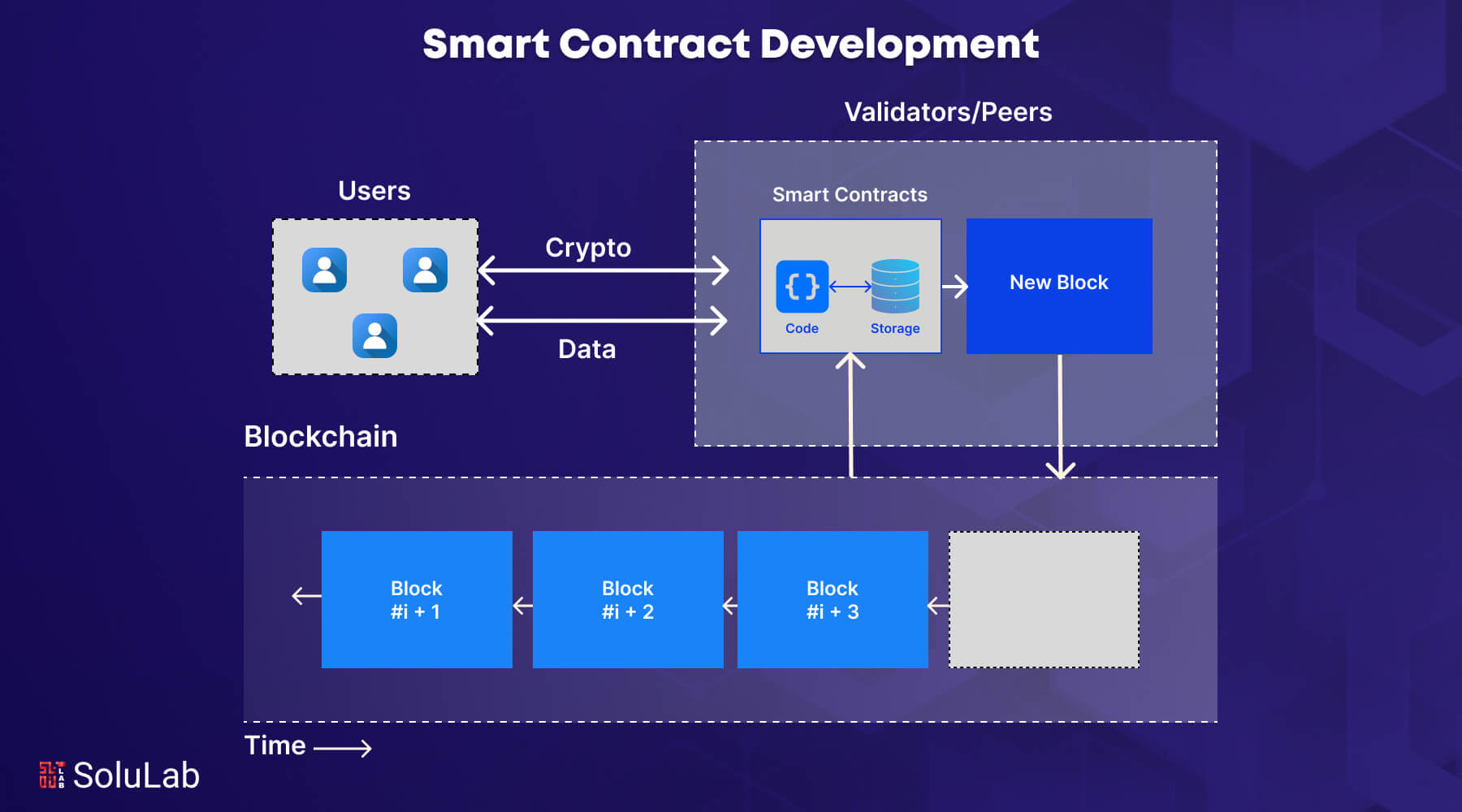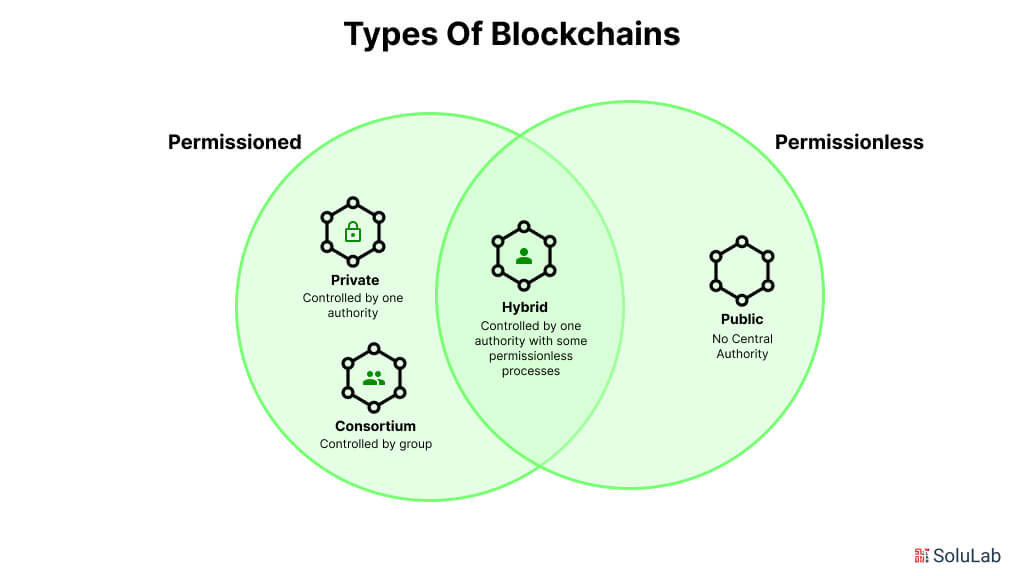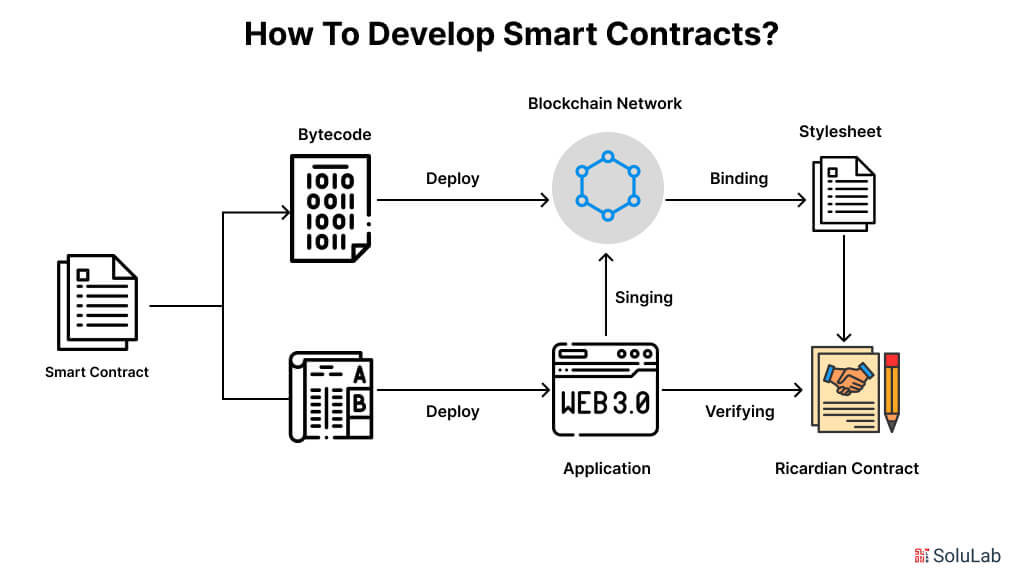
Smart contract development services are an innovative and revolutionary technology that might completely change the way we do business and communicate with one another. From 2023 to 2030, the global smart contract market is projected to expand at a CAGR of 82.2% from its 2022 valuation of USD 684.3 million. Fundamentally, smart contracts are computer programs created to automatically carry out a contract’s terms when predetermined criteria are satisfied. Because these requirements are included in the code, there is no need for middlemen, making the process more open, safe, and effective.
Blockchain technology, a safe and decentralized digital ledger system that enables peer-to-peer transactions without the need for a central middleman, is the foundation upon which smart contracts are built. All transactions are guaranteed to be safe and impenetrable by the blockchain, which offers an unchangeable and visible record of each one.
Specific knowledge of programming languages is needed for the development of smart contracts. Solidity is the language used to generate smart contracts on the Ethereum blockchain; other blockchain platforms, such as EOS and Tron, have their own programming languages. Smart contract developers need to be proficient programmers, but they also need to have a thorough grasp of the legal and regulatory frameworks that control the sectors in which their contracts will be used.
We will go deeply into how to build smart contracts in this blog, covering the technology, its uses, and the process of creating them.
What are Smart Contracts?
Self-executing computer programs, or “smart contracts,” are made to autonomously enforce and carry out a contract’s provisions. Blockchain technology, on which these contracts are based, enables decentralized, safe, and transparent transactions.
Blockchain smart contract development don’t need a third party to monitor and enforce them, in contrast to traditional contracts. Rather, the terms and conditions are built into the agreement, and it is automatically executed upon the fulfillment of specific requirements. As a result, middlemen like bankers, attorneys, and other intermediaries are no longer necessary.
Additionally, smart contracts are unchangeable and tamper-proof, which means that once they are developed and implemented on a blockchain network, they cannot be removed or changed. This lowers the possibility of fraud and corruption while also making them extremely dependable and safe. Smart contract application development has the power to completely change how contracts are carried out and upheld, resulting in a quicker, less expensive, and more effective procedure.
Overview of Smart Contract Development
The process of writing self-executing digital contracts that are stored on a blockchain is known as “blockchain smart contract development.” These agreements do away with the need for middlemen like attorneys or notaries by automatically enforcing the guidelines and policies decided upon by the parties.
Smart contracts may be tailored to a business’s unique requirements and are expressed in code. They have several uses, including supply chain management and digital identity verification, and are transparent and safe. Writing and deploying code on the blockchain for smart contract creation demands programming knowledge and blockchain technology competence.
How Do Smart Contracts Work?
On Ethereum Machines, which are decentralized networks with distributed ledgers, all digital contracts are carried out. This indicates that all data is saved in blocks and that there isn’t a single dedicated server. Every user serves as a processor, verifying certain conditions stated in contracts. Every piece of information is recorded throughout the chain, causing the blockchain’s state to change. While the status of the system is unaltered, users can examine data.
The computer language Solidity, which was developed especially for creating self-executing agreements, is used by the developers and is similar to JavaScript. The document is a byte code that is distributed to the community, or alternatively, it is a decentralized application (DApp).
A crucial component of user interaction with digital contracts is tokens. These days, tokens may be created from almost anything as they represent rights related to assets, digital ownership, and concepts, tokens can stand in for digital assets like music and art (eg NFTs for digital art pieces). Any asset can be encoded, including actual physical possession of a legal right, such as the rights to leased real estate and artwork, or contracts pertaining to the supply of oil. In relation to it, a complete product may be tokenized.
Smart contracts on blockchains are used to create non-fungible tokens (NFTs), which are among the most well-known instances of tokenization. Digital representations of real-world items including music, movies, video game products, and artwork are called NFTs. They let you control the NFTs’ transferability and ownership assignments.
The method employs the “if-then” pattern, which explicitly specifies the potential user actions and produces a response as a result. All the parameters, functions, and other information required to decode every transaction are included in this code.
The following are the steps of execution:
- Define the topic: Let’s say you want to provide your clients with a software solution. All agreement points are encoded and sent to the network.
- Closing a ransaction with the client: Every provision of the contract is open to discussion before it is signed by all parties.
- Verification of the agreement: Blockchain ensures that all conditions are met by both sides. At this point, the transaction will happen. Subsequently, the funds are taken out and sent to the beneficiary. The code creates the first record and everyone that comes after it. This keeps going until all of the contract’s requirements are fulfilled.
Blockchain Technology in Smart Contract Development
Blockchain technology is a distributed ledger system that records transactions across multiple computers in a way that ensures transparency, security, and immutability. Each transaction is grouped into a “block” and linked together in a chronological chain, forming a continuous and tamper-proof record of activity.
The key features of blockchain technology include decentralization, cryptographic security, consensus mechanisms, and transparency. These features make blockchain an ideal platform for various applications beyond cryptocurrencies, including smart contracts.
Types of Blockchains

1. Public Blockchains: Public blockchains are open networks where anyone can participate, read, and write data. Examples include Bitcoin and Ethereum. Public blockchains are decentralized and trustless, meaning no single entity has control over the network.
2. Private Blockchains: Private blockchains are permissioned networks where access to read and/or write data is restricted to a specific group of participants. Private blockchains are often used by enterprises and organizations for internal purposes, allowing them to maintain control over the network while still benefiting from blockchain technology.
3. Consortium Blockchains: Consortium blockchains are a hybrid of public and private blockchains, where a group of organizations collaboratively operate and control the network. Consortium blockchains offer a balance between decentralization and control, making them suitable for industries that require collaboration among multiple stakeholders.
Role of Blockchain in Smart Contract Execution
Tokenization in Blockchain plays a crucial role in the execution of smart contracts by providing a secure and decentralized environment for their operation. Smart contracts are self-executing contracts with the terms of the agreement directly written into code. When deployed on a blockchain, smart contracts leverage the following aspects of blockchain technology:
- Decentralization: Smart contracts run on a decentralized network of nodes, eliminating the need for intermediaries and ensuring trustless execution.
- Immutability: Once deployed on the blockchain, smart contracts are immutable and tamper-proof, meaning their code and execution cannot be altered by any single entity.
- Transparency: All transactions and contract interactions are transparently recorded on the blockchain, allowing participants to verify the integrity and history of smart contracts.
- Consensus Mechanisms: Blockchain consensus mechanisms ensure that all nodes on the network agree on the validity of transactions and contract execution, maintaining the integrity of smart contracts.
Benefits of Smart Contract Development
In recent years, smart contracts—self-executing computer programs that operate on a blockchain—have grown in popularity. The following are some benefits of developing smart contracts for your company:
-
Enhanced Effectiveness
Numerous tasks associated with carrying out a contract, including identity verification, payment execution, and contract enforcement, may be automated using smart contracts. Because it streamlines the contract execution process and does away with the need for middlemen, this may save firms both money and time.
Read Blog: Benefits of Blockchain-as-a-Service?
-
Increased Safety
Once smart contracts are implemented on a blockchain, they cannot be changed and are impervious to tampering. They become far more secure as a result, and the possibility of fraud or other interference is decreased. Furthermore, smart contracts employ encryption to safeguard contract data and guarantee that only authorized parties may access it.
-
Higher Transparency
Blockchain consulting offers an open and unchangeable record of all transactions, is used to carry out smart contracts. Since all parties to the contract have access to the same information and records, this promotes accountability and transparency.
-
Lower Expenses
Smart contracts may drastically lower the expenses involved in carrying out a contract by doing away with the need for middlemen like bankers, attorneys, and other intermediaries. Furthermore, smart contracts can lower the possibility of mistakes and disagreements, which will cut expenses even more for companies.
-
Enhanced Reliability
Because smart contracts are automatically performed in accordance with predefined circumstances, they are extremely dependable. This guarantees that the contract is carried out precisely as planned and lowers the possibility of mistakes or omissions.
-
Accelerated Speed
By automating many of the necessary stages, smart contracts may greatly accelerate the contract execution process. This can shorten the time needed to carry out an agreement, which is especially advantageous for contracts with tight deadlines.
-
Better Precision
Because smart contracts operate automatically in response to preset parameters, there is less chance of mistakes or omissions. This can lessen the possibility of disagreements or misunderstandings and increase the precision with which contracts are executed.
-
Adaptable Contract Conditions
Smart contracts may be tailored to your company’s unique requirements. This saves you from using pre-made contract templates and enables you to customize the terms of the agreement to your own needs.
-
Getting into a Global Marketplace
On a blockchain network, smart contracts may be carried out, giving users access to a worldwide market. By enabling you to sign contracts with people all around the world, this can increase the potential for your firm.
-
Improved Trust
As an unchangeable and transparent record of every transaction, smart contracts may foster more confidence between parties. By doing this, the chance of disagreements or miscommunications can be decreased and trust between the parties can grow.
Use Cases of Smart Contract
Digital contracts are being cleverly used by supply chains, insurance companies, and many more to cut expenses on administration and services. Let’s examine the many industry use cases for smart contracts:
-
Real Estate
The procedure of purchasing and selling flats is changing due to real estate smart contracts. They integrate the roles of brokers and notaries into a single, self-contained system. It is not required to negotiate a price, make changes to the title, or do any other tasks that are normally performed by attorneys and real estate investment agents.
Check Out Our Blog: Revolutionizing Real Estate With Blockchain Technology
-
Payment Services
Digital contracts can handle a lot of loan-serving tasks, including paying taxes, insurance companies, and collecting and disbursing payments. Each operation is independent, publicly responsible, and completely encrypted. They can be applied to banking processes both inside and outside the company. Furthermore, by simplifying the procedure, they have eliminated the possibility of human error.
-
Healthcare
The introduction of an Electronic Health Record System (EHR) transformed healthcare delivery in a regional healthcare system that was beset by ineffective paper-based patient records. The health institution prepared its medical staff to ensure a seamless adoption after choosing a reliable EHR vendor and negotiating a thorough contract that prioritized data security and interoperability.
-
Insurance
The current insurance system is costly and does not inspire confidence among stakeholders. Using digital assets for insurance rather than creating a ton of paper agreements might be the solution to this issue.
-
Supply Chain
In addition to other critical points in the supply chain and procurement automation, smart contract technology may be integrated into a product as soon as it is loaded into a truck or transported to its final destination. Payments are made in compliance with the document’s parameters to each party in the supply chain upon delivery of the goods. A corporation may also receive a notification from the system if its stock falls below a certain level, indicating the need for a product reorder.
How to Develop Smart Contracts?

The creation of smart contracts is a difficult process that calls for a thorough grasp of blockchain technology, encryption methods, and programming languages.
-
Determine the Business Requirement
Determining the business requirement for a smart contract is the first stage in the development process. This entails determining the contract’s parties, the operations that can be automated, and the advantages of automation.
-
Specify the Contract Terms
Determining the contract’s terms is the next stage. This entails stating who is who, what the terms are, and what has to happen in order for the contract to go into effect. To make sure the smart contract deployment appropriately represents the conditions of the agreement, this stage is essential.
-
Select the Blockchain Network
Selecting a blockchain platform to implement the smart contract on is the next stage. This entails comparing and contrasting systems according to attributes including usability, security, and scalability. The blockchain systems Ethereum, Hyperledger Fabric, and EOS are well-liked for developing smart contracts.
-
Choose a Programming Language
Choosing a programming language to create the smart contract is the next stage. Solidity, the programming language used on the Ethereum platform, is the most often utilized for creating smart contracts. Additional programming languages utilized in the creation of smart contracts are Simplicity, Chaincode, and Vyper.
-
Create the Smart Contract Code
The smart contract must then be coded using the programming language and contract terms chosen in the earlier stages. This entails writing the code that, in accordance with the parameters specified in the contract terms, will carry out the agreement. To make sure that the contract works as planned, the code has to be designed very precisely.
-
Test the Smart Contract
It is crucial to properly test the smart contract after it has been decided on how to design a smart contract to make sure it functions as planned. This entails assessing the contract’s performance as well as checking the code for mistakes and defects. To make sure the smart contract works as planned, testing is an essential stage in the development process.
-
Deploy the Smart Contract
The smart contract may be implemented on the selected blockchain platform after it has been tested. This entails running the smart contract code after uploading it to the blockchain. The parties to the contract can oversee and control the smart contract once it has been implemented.
-
Monitor and Manage the Smart Contract
Monitoring and maintaining the smart contract is the last phase in the creation process. This entails keeping an eye on how the contract is being carried out, handling any problems that come up, and revising the contract as necessary. To make sure the contract is safe and keeps working as intended, it is crucial to keep an eye on it and manage it.
What Is The Standard Time To Complete A Smart Contract Development?
Creating a smart contract would typically take seven to fifteen days depending on the framework and complexity, the developer’s experience. However, this is not the precise amount of time needed to create a smart contract. The following are some possible variables that might affect how long it takes to establish a smart contract:
- Expertise of the developer in programming languages
- Resources
- Testing and fixing the issues
- To ensure precision and safety
It won’t take more than a month to create a smart contract. Once everything is finished, you may start using your smart contract right away. We are grateful for the abundance of modern innovations that have made the production of smart contracts easier.
Conclusion
The use of smart contracts has completely changed how agreements are carried out across a range of businesses. Transactions are now more safe, efficient, and economical thanks to smart contracts, which also automate procedures and increase transparency. Nonetheless, it is important to take into consideration the difficulties in creating and evaluating smart contract code in addition to the security threats presented by blockchain networks. Therefore, in order to make sure that a smart contract is in line with the aims and objectives of all parties concerned, it is necessary to carry out a full study of the advantages and dangers prior to implementing it. The future of smart contract deployment is bright, and as blockchain technology develops further, we should anticipate many more creative applications of smart contracts in the years to come.
SoluLab, as a top smart contract development company, offers a comprehensive suite of services to streamline the smart contract development process. Our expert consultation ensures a deep understanding of your business needs, leading to tailored smart contract solutions. With a focus on platforms like Ethereum, Hyperledger, and EOS, our seasoned blockchain developers craft secure, efficient, and scalable smart contracts. We conduct rigorous audits to identify and rectify vulnerabilities, integrate seamlessly with existing systems, tokenize assets, optimize for gas efficiency, and provide continuous support and maintenance. Ready to elevate your blockchain project? Contact SoluLab today to leverage our expertise and drive decentralized innovation.
FAQs
1. What is smart contract development?
The process of developing, testing, and implementing computer programs that carry out contracts on a blockchain automatically is known as smart contract development.
2. What are the 4 major parts of a smart contract?
The 4 major parts are the contract address, state variables, functions, and events. These components handle the contract’s identity, store data, execute logic, and record actions.
3. What are the components of a smart contract?
Smart contracts comprise data storage, functions, conditions, and interfaces for interactions. Together, they automate transactions on the blockchain.
4. What Is the Timeline for Smart Contract Development?
Development timelines depend on complexity, usually ranging from 2 weeks to 2 months. Factors include functionality, testing, and security audits.
5. How much does smart contract development cost?
Costs vary based on scope and expertise, typically ranging from $5,000 to $50,000, covering design, coding, and auditing.





